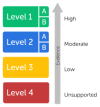Pharmacogenetic Guidelines for Psychotropic Drugs: Optimizing Prescriptions in Clinical Practice
- PMID: 38004520
- PMCID: PMC10674305
- DOI: 10.3390/pharmaceutics15112540
Pharmacogenetic Guidelines for Psychotropic Drugs: Optimizing Prescriptions in Clinical Practice
Abstract
The modalities for prescribing a psychotropic (dose and choice of molecule) are currently unsatisfactory, which can lead to a lack of efficacy of the treatment associated with prolonged exposure of the patient to the symptoms of his or her illness and the side effects of the molecule. In order to improve the quality of treatment prescription, a part of the current biomedical research is dedicated to the development of pharmacogenetic tools for individualized prescription. In this guideline, we will present the genes of interest with level 1 clinical recommendations according to PharmGKB for the two major families of psychotropics: antipsychotics and antidepressants. For antipsychotics, there are CYP2D6 and CYP3A4, and for antidepressants, CYP2B6, CYP2D6, and CYP2C19. The study will focus on describing the role of each gene, presenting the variants that cause functional changes, and discussing the implications for prescriptions in clinical practice.
Keywords: antidepressant; antipsychotics; cytochrome; pharmacogenetics; prescription assistance; psychotropic.
Conflict of interest statement
The authors declare no conflict of interest.
Figures
Similar articles
-
Case report: Avoiding intolerance to antipsychotics through a personalized treatment approach based on pharmacogenetics.Front Psychiatry. 2024 Mar 19;15:1363051. doi: 10.3389/fpsyt.2024.1363051. eCollection 2024. Front Psychiatry. 2024. PMID: 38566958 Free PMC article.
-
Towards the implementation of CYP2D6 and CYP2C19 genotypes in clinical practice: update and report from a pharmacogenetic service clinic.Int Rev Psychiatry. 2013 Oct;25(5):554-71. doi: 10.3109/09540261.2013.838944. Int Rev Psychiatry. 2013. PMID: 24151801 Review.
-
Variability Between Clinical Pharmacogenetics Implementation Consortium (CPIC®) Guidelines and a Commercial Pharmacogenetics Laboratory in Genotype to Phenotype Interpretations For Patients Utilizing Psychotropics.Front Pharmacol. 2022 Jun 24;13:939313. doi: 10.3389/fphar.2022.939313. eCollection 2022. Front Pharmacol. 2022. PMID: 35814245 Free PMC article.
-
Contrasting ABCB1 pharmacogenetics and psychotropic responses in child and adolescent psychiatry: a case comparison.Pharmacogenomics. 2023 Feb;24(3):131-139. doi: 10.2217/pgs-2022-0120. Epub 2023 Feb 2. Pharmacogenomics. 2023. PMID: 36727491
-
Clinical applications of CYP genotyping in psychiatry.J Neural Transm (Vienna). 2015 Jan;122(1):5-28. doi: 10.1007/s00702-014-1300-5. Epub 2014 Sep 9. J Neural Transm (Vienna). 2015. PMID: 25200585 Review.
Cited by
-
Pharmacogenetics testing for poor response to antidepressants: a transnosographic case series.Front Pharmacol. 2024 Oct 9;15:1440523. doi: 10.3389/fphar.2024.1440523. eCollection 2024. Front Pharmacol. 2024. PMID: 39444600 Free PMC article.
-
Understanding sexual dysfunction in french military service member with PTSD: findings from a descriptive study.Basic Clin Androl. 2025 May 26;35(1):19. doi: 10.1186/s12610-025-00266-1. Basic Clin Androl. 2025. PMID: 40419942 Free PMC article.
-
Benchmarking large language models for replication of guideline-based PGx recommendations.Pharmacogenomics J. 2025 Jul 26;25(4):23. doi: 10.1038/s41397-025-00383-0. Pharmacogenomics J. 2025. PMID: 40715040
References
-
- Rush A.J., Williams N.R., Heifets B.D., Blasey C., Sudheimer K., Pannu J., Pankow H., Hawkins J., Birnbaum J., Lyons D.M., et al. Acute and Longer-Term Outcomes in Depressed Outpatients Requiring One or Several Treatment Steps: A STAR*D Report. AJP. 2006;163:1905–1917. doi: 10.1176/ajp.2006.163.11.1905. - DOI - PubMed
-
- Lieberman J.A., Stroup T.S., McEvoy J.P., Swartz M.S., Rosenheck R.A., Perkins D.O., Keefe R.S.E., Davis S.M., Davis C.E., Lebowitz B.D., et al. Effectiveness of antipsychotic drugs in patients with chronic schizophrenia. N. Engl. J. Med. 2005;353:1209–1223. doi: 10.1056/NEJMoa051688. - DOI - PubMed
-
- Kennedy S.H., Lam R.W., McIntyre R.S., Tourjman S.V., Bhat V., Blier P., Hasnain M., Jollant F., Levitt A.J., MacQueen G.M., et al. Canadian Network for Mood and Anxiety Treatments (CANMAT) 2016 Clinical Guidelines for the Management of Adults with Major Depressive Disorder: Section 3. Pharmacological Treatments. Can. J. Psychiatry. 2016;61:540–560. doi: 10.1177/0706743716659417. - DOI - PMC - PubMed
-
- Adverse Effects of Antipsychotic Medications—PubMed. [(accessed on 15 May 2023)]; Available online: https://pubmed.ncbi.nlm.nih.gov/20187598/
Publication types
LinkOut - more resources
Full Text Sources


